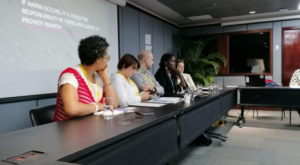For Public Development Banks to Effectively Address the World’s Crises, They Have to Be Accountable

AC’s Stephanie Amoako speaking at the Finance in Common summit
Last week, hundreds of public development banks (PDBs) met in Cartagena, Colombia for the 4th annual Finance in Common (FIC) summit to discuss how PDBs can advance the Sustainable Development Goals and address climate change and other global crises. This FIC summit proposed to develop “concrete actions to make finance more sustainable, equitable, and inclusive,“ yet the conversations largely left out the very people most affected by its members’ financing – local communities.
There are many ways to better include local communities in the co-design and implementation of publicly financed projects. One minimum obvious step is to have an effective independent accountability mechanism (IAM) that addresses project impacts that threaten to undermine sustainable development and harm people and the environment. Shockingly, not every FIC member has an IAM and even those that do fail to fully remediate issues unearthed through their IAM processes. Unfortunately, the 4th summit ended without a commitment to strengthened accountability at PDBs. It’s time for all PDBs to finally get this right, and we expect every PDB member to commit to having in place an effective IAM that facilitates remedy before the 5th FIC summit comes around.
PDBs – multilateral, regional, national, or sub-national institutions using public money to advance policy objectives – herald their role in addressing the world’s most pressing challenges. However, decades of development experience demonstrates that the impact of PDBs’ work has not been wholly positive. In its new report, Demystifying Development Finance: How Public Development Banks Impact Peoples and the Planet, the Coalition for Human Rights in Developments highlights how PDB investments have exacerbated inequality, caused environmental damage, and violated human rights. In addition to harming those who are supposed to benefit from development, these harms also jeopardize PDB goals. For example, the U.S. Overseas Private Investment Corporation (now the U.S. International Development Finance Corporation) financed a biomass project in Liberia that aimed to develop renewable energy in the post-conflict country. Instead, due diligence failures and inadequate project monitoring resulted in labor violations, contaminated water sources, and sexual abuse of local women, and the development objectives were not met.
PDBs must commit to preventing harm through robust human rights, social, and environmental due diligence throughout the project cycle. And they must create effective IAMs. IAMs allow communities to raise concerns about projects and seek remedy through a compliance investigation into whether projects have followed environmental and social requirements or a dispute resolution process that brings parties together to find a mutually agreeable solution. In addition to addressing concerns, lessons from IAM cases can strengthen institutions’ practices for more sustainable projects.
The World Bank created the first accountability mechanism in 1993, and several multilateral and bilateral public development banks, as well as some private banks and foundations, have followed suit since then. Now is the time for other PDBs to create IAMs, incorporating the good practices identified from 30 years of IAM practices – including requirements for disclosure of the IAM to affected communities, consultation on proposed remedial action plans, and transparency of case outcomes. Accountability mechanisms that facilitate remedy shouldn’t be a tough sell.
Importantly, now is also the time for institutions that already have IAMs to strengthen these offices and ensure a robust institutional commitment to remedy. Although IAMs have been important tools for identifying and preventing harm and bridging information gaps between investors and communities, IAM processes often do not result in the full remediation of identified harm. For example, of the 206 complaints filed to the Inter-American Development Bank’s IAM – the IDB was one of the hosts of this year’s FIC summit – only 19 have resulted in any commitments from the IDB Group or its clients to remedy harm. Implementation of any remedial commitments only occurred in 12 of those 19 cases. In order to keep unremediated harms from undermining sustainable development, institutions must address this remedy gap.
If PDBs really want development investments to meet their mark and address the many crises facing the globe, they must commit to being accountable to local communities. Creating a strong IAM that facilitates remedy for negative environmental and social impacts is a necessary step towards this goal. The FIC summit communiqué includes a charge for the joint coordination mechanism between civil society and FIC to develop a joint working plan. This working plan should include a push for IAMs. If PDBs don’t have accountability and remedy structures in place by the fifth Finance in Common summit, we should question the sincerity of their commitment to making finance “more sustainable, equitable, and inclusive.”

